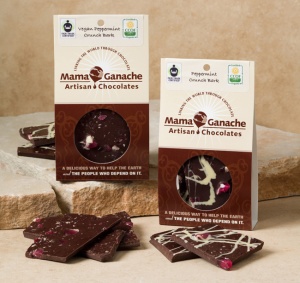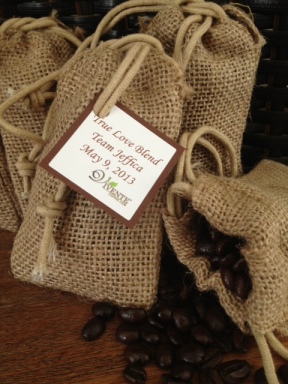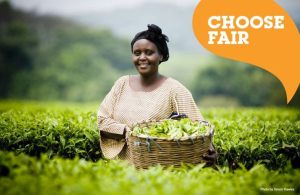Latest Event Updates
Fair Trade Wedding Favors
Check out these wedding favors in burlap bags — What a great way to support Fair Trade and wow your guests all at the same time!! Contact us below if you want assistance with these fun favors!
How Does Fair Trade Help The Poor?
USING TRADE TO BALANCE EQUALITY IN THE DEVELOPING WORLD
Fair Trade farmers and producers are guaranteed a fair price for their crops and goods. They are empowered to compete in the global marketplace through direct, long-term contracts with international buyers. This market access lifts farming and producer families from poverty through trade.
Keeping food on the table, children in school and families on their land. Workers doing business within the Fair Trade model are also guaranteed fair wages and safe working conditions, and forced child labor or any human exploitation is strictly prohibited. In many situations, workers are paid an additional Fair Trade premium for use on long-term social and business development projects such as healthcare, scholarships, women’s leadership initiatives and micro- finance programs.
The Fair Trade model is a viable option to empower the developing world thus creating safe, thriving communities where equality can be found. When you purchase Fair Trade products, you are not only acknowledging the hard work performed in the developing world, but you can also know that the producers of that product have been treated fairly and are living slave free lives.
WATCH FOR THE LABELS
The Fair Trade labels offer consumers a simple way to know that their products were produced in a socially-responsible manner. The third-party verification guarantees that strict social, economic and environmental standards have been met. Now more than 11,000 different products can be found in over 70,000 retail locations across the United States.
What Grade Coffee Are You Drinking?
Vivente Coffee only serves Grade 1 coffees which is the highest grade on the market and considered a Specialty Coffee. So how do we ensure the quality that you demand? We work with one of the best in the business, (Bodhi Leaf Coffee Traders) as our importer and they are Certified Q-Graders. This translates into a person that has been certified in grading green coffee, roast identification, and coffee cupping. Vivente considers coffee to be an art, that is why we take the proper steps to deliver only the best single source coffees from around the world to our supporters.
Grade 1: Specialty Grade Coffee Beans: no primary defects, 0-3 full defects, sorted with a maximum of 5% above and 5% below specified screen size or range of screen size, and exhibiting a distinct attribute in one or more of the following areas: taste, acidity, body, or aroma. Also must be free of cup faults and taints. Zero quakers allowed. Moisture content between 9-13%.
Grade 2: Premium Grade Coffee Beans: Same as Grade 1 except maximum of 3 quakers. 0-8 full defects.
Grade 3: Exchange Grade Coffee Beans: 50% above screen 15 and less than 5% below screen 15. Max of 5 quakers. Must be free from faults. 9-23 full defects.
Grade 4: Standard Grade Coffee Beans: 24-86 full defects.
Grade 5: Off Grade Coffee Beans: More than 86 full defects.
All of our coffees at Vivente are 100% Fair Trade Organic Coffee which means you’re also helping these farming families make a sustainable living through their farming. On top of that, we donate 35% of the profit to a project of your choice when checking out of the online cart. Please click here or on our logo above and try a bag today!
Fair Trade World is organized as a “Not for Profit” and our mission is to eradicate poverty and slavery using fair trade practices. Focusing on vulnerable communities in the developing world, we help individuals and families create healthy, prosperous communities where equality and justice can be found.
Partners with Fair Trade USA
Accountability
How many times has the question been asked when purchasing a Fair Trade product, how do I really know that my dollars are helping people in the developing world?
Fair Trade USA is a 501 (c) (3) nonprofit organization, they are the leading third-party certifier of Fair Trade products in the United States. They provide farmers in developing nations the tools to thrive as international business people. Instead of creating dependency on aid, they use a market-based approach that gives farmers fair prices, workers safe conditions, and entire communities resources for fair, healthy and sustainable lives. They seek to inspire the rise of the Conscious Consumer and eliminate exploitation.
It is this organization that Fair Trade World is accountable! We are a Licensed Partner with Fair Trade USA, and that means that they monitor our supply chains. This ensures that the farmers are receiving the proper Fair Trade wage and the many community benefits that the Fair Trade model provides.
Without accountability, you would never truly know that your dollars are making a difference! So please buy Fair Trade Certified goods and help change one life at a time!
Licensed Partner Link: View this link to verify that Fair Trade World is a licensed partner with Fair Trade USA.
Thank you for helping fight poverty and slavery!
Help Feed The Children
5 Loaves Ministry ~ A Fair Trade World Partner
The heart of 5 Loaves is to feed children in developing nations who would otherwise not eat on a regular basis. We currently feed
 these children by partnering with other NGO’s or orphanages which may or may not have a feeding program of their own. 5 Loaves’ primary purpose is to pray for, raise awareness of, and financially support the feeding programs that it oversees.
these children by partnering with other NGO’s or orphanages which may or may not have a feeding program of their own. 5 Loaves’ primary purpose is to pray for, raise awareness of, and financially support the feeding programs that it oversees.
When you purchase from the Fair Trade World Online Store, please select “5 Loaves” when checking out of the shopping cart and 35% of the profit will be donated to help feed children around the world.
Visit 5 Loaves Facebook page today and see how you can make a difference! Or visit 5 Loaves website by clicking on their logo above.
Cotton Producers in India
The Source of Our Fair Trade Cotton Shirts

The Chetna Organic Cotton Project was launched in 2004 to improve the livelihoods of small, marginalized Indian farmers through the integration of organic and Fair Trade principles at the root of the supply chain. The project promotes sustainable agriculture and fair prices. Farmers produce 100 percent organic and Fair Trade Certified™ cotton without child labor, synthetic pesticides and fertilizers, or GMOs.
Farmers have a direct role in decision-making throughout the production and selling processes. Farmers have representation in two cooperatives: the Chetna Organic Farmers’ Association and the Chetna Organic Agriculture Producer Company. These oversight organizations ensure that the project’s goals are carried out and that benefits go directly to farmers.
Garments manufactured from Chetna cotton are completely traceable back to the farmer’s field where they originated. Farmers are also extensively trained in quality control procedures and certification standards. In six years the project has expanded from 240 farmers to more than 6,000 farmers mainly from tribal belts in India. Almost all of the cotton produced is purchased by an organic and Fair Trade certified factory called Rajlakshmi Cotton Mills Pvt. Ltd.
This established relationship provides many benefits:
- Contracts start at the beginning of the season to enable farmers to secure bank loans.
- Chetna farmers are shareholders in Rajlakshmi Cotton Mills.
- Farmers have access to pre-financing of up to 30 percent of cotton harvest.
- Fair Trade premiums for community development have helped set up schools and other social programs in farmer villages.
- Fair Trade buyers pay for crops as soon as they are harvested, which immediately provides the farmers with much-needed income.
During 2008-09, the 6,000 farmers earned a total of $43,000 in Fair Trade premiums and together decided on projects to use the funds. The Chetna cotton project fosters the entrepreneurial capacities of farmers, and improves quality of life for farmers and their families. It also offers high-quality organic and Fair Trade cotton to companies and consumers in the U.S
Fair Trade Improves Quality of Life (Animal Grazing Areas, Women’s Bathrooms)
In a village called Keliveli located in the district of Akola in Maharashtra, Fair Trade premiums were used to clear thorny plants from an area where animals graze and to construct a women’s restroom. These projects have resulted in important quality of life improvements for farmers and their families. One Chetna farmer called Fair Trade “A transparent mechanism of trading with no exploitation from buyers or sellers.”
Fair Trade Improves Safety and Profits
Previously, farmers had to risk their families’ health and safety by storing cotton in their homes and selling at high season, which yielded the lowest profits. Fair Trade premiums were used to construct a warehouse where cotton can be stored until low season when prices are higher. Farmers no longer have a dangerous fire hazard in their living spaces.
Click on the shirt to visit our online store
The Difference Between Free Trade & Fair Trade
Free Trade Vs. Fair Trade – Not The Same!
Many people confuse the terms “Free Trade”, which has played a major role in countries’ trade policies in the past few decades, with “Fair Trade“. The table below will help clarify the key differences between the two terms.
| Free Trade | Fair Trade | |
| Main goal: | To increase nations’ economic growth | To empower marginalized people and improve the quality of their lives |
| Strategy: | Profit is the overriding concern | Balances concerns for people, the planet, and profit |
| Primarily benefits: | Multinational corporations, powerful business interests | Vulnerable farmers, artisans and workers in less industrialized countries |
| Critics say: | Punishing to marginalized people & the environment, sacrifices long-term relationships | Interferes with free market, inefficient, too small-scale for impact |
| Financing: | Payment is received at time of shipment; credit is sometimes extended by informal lenders at exorbitant rates. | Businesses offer producers advance credit with low- or zero-interest for income during lean seasons between harvest/production cycles |
| Producer compensation determined by: | Market & government policies | Living wage & community improvement costs. Technical assistance and training build broader skill set, and social premiums invest in social projects that benefit all residents. |
| Supply chain: | Includes many parties between producer and consumer; seeks out lowest-cost labor and raw materials, often through exploitive middlemen. | Includes fewer parties, more direct trade. Disadvantaged groups are made partners in the fair trade supply chain. |
| Marketing: | Marketing is directed at increasing profitability | Marketing is driven by consumer education and advocacy that leads to socially responsible business innovations. |
Here at Fair Trade World, we do not side with one model over the other indicating that one is superior. These are two distinctly different models that accomplish different tasks and both are important to the growth and transformation of a developing country. 🙂
Empty Your Box
Then Listen & Learn…
I was talking with one of our Board Members (Jen Mellor) and she was sharing a wonderful truth she learned from a dear friend in the Philippines. We were talking about community development and how often westerners will show up to a community in the developing world with their box full of business ideas that will change that community. Of course, many of these ideas are based on what we feel the community needs, and doesn’t necessarily reflect the people or consider their input.
 This friend that shared this with Jen had an excellent point that needs to be acknowledged! When we arrive at a community that we are seeking to help, our goal should be to empty out our box of idea’s into the nearest trash container, and allow the people of that community to fill the box based upon their skills, resources, and cultural traditions. We need to listen and learn the dynamics of that community before we launch any project. I guess you could say we need to start with a solid community assessment in order to ensure long-term success.
This friend that shared this with Jen had an excellent point that needs to be acknowledged! When we arrive at a community that we are seeking to help, our goal should be to empty out our box of idea’s into the nearest trash container, and allow the people of that community to fill the box based upon their skills, resources, and cultural traditions. We need to listen and learn the dynamics of that community before we launch any project. I guess you could say we need to start with a solid community assessment in order to ensure long-term success.
Why? People are more likely to embrace a business concept if it is one that fits them as an individual, fits their resources, and fits in the context of their culture.
As Jen shared this with me I began to see just how critical this is to any project in the developing world. Perhaps this helps explain why so many do not stick with the new work we have provided for them, but instead slip away into the woodwork.
Launching a new business project and helping those in slavery and/or poverty is wonderful. But we need to be sure we take the time to contemplate how they may feel about this new opportunity, and that this is not an opportunity we forced on them based upon our assumption of their needs and wants.
Let’s keep our boxes empty!
A Slave Free Valentine’s Day
 It’s that time of year again when we get to indulge in chocolate and romance. However, the chocolate has a dark side that many of us are unaware of. The majority of our chocolate is sourced from the cocoa plantations on the Ivory Coast, and unfortunately these plantations often utilize child slavery. As hard as it is to believe, the majority of the chocolate we buy in gas stations and grocery stores are sourced from these child slaves.
It’s that time of year again when we get to indulge in chocolate and romance. However, the chocolate has a dark side that many of us are unaware of. The majority of our chocolate is sourced from the cocoa plantations on the Ivory Coast, and unfortunately these plantations often utilize child slavery. As hard as it is to believe, the majority of the chocolate we buy in gas stations and grocery stores are sourced from these child slaves.
Now if your Valentine is anything like my wife, they love chocolate! But how do we purchase chocolate that is guaranteed to be slave free? Well, there is a wonderful solution… fair trade! Fair trade products are often promoted as being helpful to the farmers and artisans because they get paid a good wage and the model of fair trade impacts communities. While this is absolutely true, there is another benefit to it… slave free! By default (based upon regulations and requirements) fair trade products are slave free!
What a wonderful thing to be able to purchase chocolate for the one you love with a clear conscience! Any health food store in your area will most likely carry fair trade products. So, will you do the world a favor this Valentine’s day by purchasing products that do not support child slavery?
If you have any questions, please feel free to comment or contact us directly at info@FairTradeWorld.net.
A Fair Trade World
This is a look at Fair Trade and its impact on the lives involved. Does it work, or is it just a marketing scheme?
This has been a question asked by many over the past several years. But first we must realize that there are reasonable questions and not so reasonable questions. I had the opportunity to listen in on a Fair Trade (FT) debate held at JBU where the moderator asked the former CEO of Ten Thousand Villages a very interesting question. He asked “Can you site a specific example or time where Fair Trade impacted a community to such a degree that they began producing Mercedes Benz cars or something else of a larger scale?” This is what I call an unreasonable and loaded question that the moderator already knew the answer to. We do not claim Fair Trade to be the one stop shop that will end poverty as we know it. But we do claim that it has helped millions around the world make a sustainable living and even if it has only helped a few thousand people, I would still be very excited. When you look at the history and track record of Fair Trade, you cannot help but realize the many successes behind the model. Without this success it simply would not exist today! Do we really believe that farmers and artisans all around the world would be participating in FT if they did not directly experience a significant benefit to their livelihoods? However, this does not mean that the model doesn’t need any changes or modification as time goes on? As markets change and trading takes different shapes, we will have to see FT continue to adapt to the farmers and artisans best interest. Let’s keep in mind, Fair Trade is all about helping the poor of this world survive.
When you open the history books of FT you see something very unique; true relationship building directly with the beautiful people of these developing countries. Those relationships have lasted for many years and have been built upon trust, transparency and an ongoing relationship that has always brought benefit and growth to these families and communities. FT does not promise to eradicate poverty, we will always have poor with us. But it does promise to help them, and that is my goal in doing FT development, helping my neighbor make it through this life. My goal is not to industrialize the developing world, but rather to help them realize the financial benefits of their existing skill sets and to help them market those skills, thus creating economic opportunity for one individual at a time. How far must I look to see
both financial and social benefits from FT in the developing world? How about the Co-ops utilizing FT that I have purchased coffee from in South America, like “La Florida” in Peru or “UCASUMAN RL” in Nicaragua. Both democratically run organizations state clearly how they have benefitted from FT along with clear community enhancements to show further support. These are two groups that I not only get a wonderful product from, but I see individuals and families thriving on a higher level. Other farmers around the world readily explain that FT has lessened poverty for their people. The key word here is “lessen”, not eliminate nor eradicate; we do not claim that FT will launch a country into economic victory. We simply claim that it’s a piece of the puzzle and the most viable option to truly reach down and help those in need. Not only are there ample results of FT success, but with that comes much history starting back in the mid 1950’s.
“We can help the poor and needy through our everyday purchases and in doing so, show them we care. The real question is, do we truly care enough to actually alter our spending habits?”
When Edna R. Byler started selling needlework after she saw the needs of Puerto Rican women on her visit there in 1946. Edna set out on her quest to sell their products and reinvest the funds back into Puerto Rico to help these women make a living. Who knew, that this small endeavor from a caring woman to help these people make a viable living, would one day be known as Ten Thousand Villages, one of the largest FT organizations today that connects and helps millions around the world by following in Edna’s footsteps and is actually caring for the people struggling to survive in this world.
There is no question on the success of FT: the real question is, do we truly care enough about the poor in this world to actually be moved to action by altering our spending habits? When I stop and think about this for a moment, it feels very satisfying to purchase a Fair Trade product and to know that people in developing countries were helped. My purchase helped empower them to provide for their family and helped a person survive another day. The honor is mine!
So I encourage everyone that I can to support the poor through the purchasing of their goods, this does not give anyone a free ride but rather reinforces behavior to continue utilizing their skills to provide for their families. This is truly a viable way to help people all over the world make a sustainable living. So join us and choose to help the poor with your dollars starting today!
Please visit us at fairtradeforums.net to view impact studies and learn more about how Fair Trade is helping many around the world.








